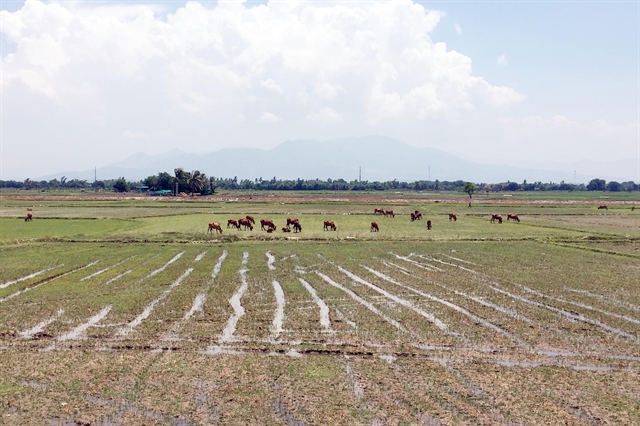 Society
Society


|
| Many rice fields in Ninh Thuận Province’s Thuận Nam District have not been planted with the summer- autumn crop because of a water shortage. – VNA/VNS Photo Công Thử |
NINH THUẬN – Farmers in Ninh Thuận are not growing any summer – autumn crop on more than 1,500ha of land due to lack of water, according to the south-central province’s Department of Agriculture and Rural Development.
The province, which gets the lowest amount of rainfall in the country, plans to crop 30,000ha, including 13,500ha of rice.
To ensure irrigation, the department has instructed farmers to only grow rice in areas where they can actively manage water.
These areas are in Ninh Phước, Ninh Hải and Ninh Sơn districts, Phan Rang – Tháp Chàm City and upstream in some other districts.
The province’s 21 reservoirs now have 107 million cubic metres of water in storage against their capacity of 194.5 million cu.m, according to the province’s Irrigation Works Exploitation One-Member Company.
Of the reservoirs, 10 have less than 1 million cu.m each.
The Đơn Dương Reservoir in neighbouring Lâm Đồng Province, which provides water for irrigation and household use in many districts in Ninh Thuận, has only 43 million cu.m compared to its capacity of 165 million cu.m.
If rains do not bring water to this reservoir, Ninh Thuận faces the risk of water shortage until the end of the crop, the company said.
Phạm Dũng, head of the province’s Plant Cultivation and Protection Sub-department, said the People’s Committee has instructed localities not to grow crops in areas where they cannot actively manage water.
Water in the reservoirs is carefully managed, with priority given to household and animals, and therefore farmers in many areas have stopped cropping, he said.
The sub-department has instructed farmers to restructure their crops to suit their farming conditions.
The province plans to grow other crops on 940ha of paddies this summer-autumn and has cropped 560ha so far, according to the sub-department.
Switching to fruits
To cope with drought, the province has in recent years switched to high-value fruits that can grow in dry areas.
Under a plan to restructure agriculture by 2030, the province seeks to increase fruit production, perennial industrial trees and vegetables and reduce food crops like rice.
The province is focusing on developing grape and jujube cultivation in Ninh Hải, Ninh Phước and Ninh Sơn districts and Phan Rang – Tháp Chàm City.
It hopes to have 2,000ha under grapes and an annual output of 50,000 tonnes next year and 1,200ha under jujube and output of 55,000 tonnes.
It is also developing durian, avocado, rambutan and mangosteen cultivation in Ninh Sơn District, xiêm coconut, grown for juice, in Ninh Hải and Thuận Nam districts, soursop and green-peel and pink-flesh grapefruit in Thuận Bắc and Bác Ái districts.
Pi Năng, who converted his 5,000sq.m corn field into a green-peel and pink-flesh grapefruit orchard in Bác Ái’s Phước Bình Commune five years ago, said in the past he had to stop growing corn in the dry season because of lack of water.
His orchard is fruiting now, and he usually earns VNĐ70 million (US$3,000) per crop, he said.
Grapefruit is easy to grow, affected by few diseases and suitable for growing in his commune, he said.
Besides, the entire harvest is snapped up by traders because of high demand, he added.
Phạm Hùng Bảo Châu, deputy chairman of the Phước Bình People’s Committee, said his commune has zoned areas for fruits like green-peel and pink-flesh grapefruits, durian, avocado, banana, and jackfruit to restructure agriculture.
The fruits have high value and the weather and soil conditions in the commune suit them, he said.
They have stable and high yields because farmers use advanced farming techniques, he added.
The province encourages farmers to use water-efficient irrigation equipment and grow crops to Vietnamese good agricultural practice standards.
The province has more than 5,950ha under fruits, according to the department. – VNS




